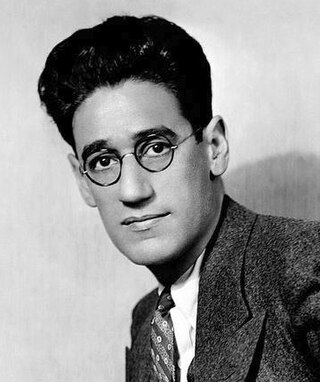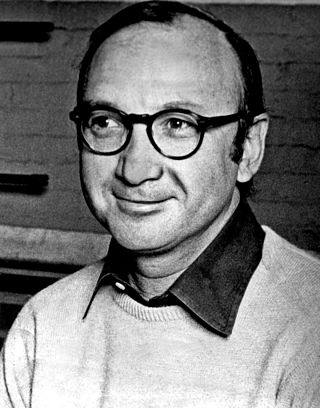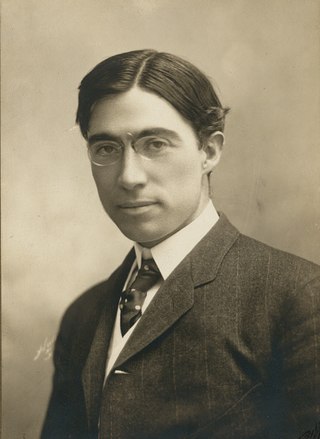
Why Marry? is a 1917 play written by American playwright Jesse Lynch Williams. It won the first Pulitzer Prize for Drama in 1918.

Why Marry? is a 1917 play written by American playwright Jesse Lynch Williams. It won the first Pulitzer Prize for Drama in 1918.
Why Marry? premiered on Broadway at the Astor Theatre on December 25, 1917 and closed on April 1, 1918 after 120 performances. Directed by Roi Cooper Megrue, the cast featured Estelle Winwood (Helen), Edmund Breese (John), Lotus Robb (Jean), Harold West (Rex), Beatrice Beckley (Lucy), Ernest Lawford (Cousin Theodore), Nat C. Goodwin (Uncle Everett), and Shelley Hull (Ernest). [1] [2] The play was based on Williams' short story And So They Were Married. [3]
The play won the 1918 Pulitzer Prize for Drama. [4] A member of the Pulitzer Prize jury wrote: "I have seen Why Marry?...and find it an admirable piece of comedy...There are some things in the piece which I do not like but on the whole it is the best piece of drama I have seen this year." [2]
The East Lynne Theater Company presented Why Marry? in Cape May, New Jersey in 2006 and 2007. [5]
The play takes place during a weekend at a country house.
The characters are: Jean, the host's youngest sister, brought up to be married; Rex, an unmarried neighbor; Lucy, the hostess; Cousin Theodore, a clergyman who does not believe in divorce; John, the host, who owns the house—"and almost everyone in it"—also does not believe in divorce; Uncle Everett, a judge, who does believe in divorce; Helen, the host's other sister who does not want to marry, although everyone wants to marry her; Ernest, a scientist who believes in neither marriage or divorce. [2]
In the Introduction to the script, Williams wrote that near the end of the play, many relatives were to arrive for dinner, and to "influence the recalcitrant couple...though the family may have its place in the book, it proved to be an awful nuisance on the stage...It was not clear who was who...So we decided that the family had to be destroyed". [6]
In his review for The New York Times, Nat Goodwin wrote: "The holy estate was again up for inspection last night at the Astor. Jesse Lynch Williams would, it is to be presumed, acknowledge the debt to Bernard Shaw which is owed by so many writers of modern social comedy...his play is written from a thoroughly original point of view, is as keenly satirical as Shaw at his best, and, last but not least, amusing...a play which is perhaps the most intelligent and searching satire on social institutions ever written by an American." [7]
Brenda Murphy wrote: "The presentation of the first Pulitzer Prize for drama...for his sophisticated discussion play Why Marry? was the first clear sign that realism had arrived in the American theater...[the] play combined the...traditional subjects of the American discussion play with the Shavian notion that serious points about serious issues could be made through witty dialogue and comic, even farcical, action." [8]

George Simon Kaufman was an American playwright, theater director and producer, humorist, and drama critic. In addition to comedies and political satire, he wrote several musicals for the Marx Brothers and others. He won the Pulitzer Prize for Drama for the musical Of Thee I Sing in 1932, and won again in 1937 for the play You Can't Take It with You. He also won the Tony Award for Best Director in 1951 for the musical Guys and Dolls.

Marvin Neil Simon was an American playwright, screenwriter and author. He wrote more than 30 plays and nearly the same number of movie screenplays, mostly film adaptations of his plays. He received three Tony Awards and a Golden Globe Award, as well as nominations for four Academy Awards and four Primetime Emmy Awards. He was awarded a Special Tony Award in 1975, the Kennedy Center Honors in 1995 and the Mark Twain Prize for American Humor in 2006.

Eugene Gladstone O'Neill was an American playwright. His poetically titled plays were among the first to introduce into the U.S. the drama techniques of realism, earlier associated with Chekhov, Ibsen, and Strindberg. The tragedy Long Day's Journey into Night is often included on lists of the finest U.S. plays in the 20th century, alongside Tennessee Williams's A Streetcar Named Desire and Arthur Miller's Death of a Salesman. He was awarded the 1936 Nobel Prize in Literature. O'Neill is also the only playwright to win four Pulitzer Prizes for Drama.

Jesse Lynch Williams was an American author and dramatist. He won the first Pulitzer Prize for Drama for his play Why Marry? (1917). He was a journalist for three New York publications and co-founded the Princeton Alumni Weekly and the Princeton Triangle Club.
David Auburn is an American playwright, screenwriter and theatre director. He is best known for his 2000 play Proof, which won the 2001 Tony Award for Best Play and Pulitzer Prize for Drama. He also wrote the screenplays for the 2005 film version of Proof, The Lake House (2006), The Girl in the Park (2007), and Georgetown (2019).

Frances Goodrich was an American actress, dramatist, and screenwriter, best known for her collaborations with her partner and husband Albert Hackett. She received the Pulitzer Prize for Drama with her husband in 1956 for The Diary of Anne Frank which had premiered the previous year.
J.B. is a 1958 play written in free verse by American playwright and poet Archibald MacLeish, and is a modern-day retelling of the story of the biblical figure Job. The play is about J.B., a devout millionaire with a happy domestic life whose life is ruined. The play went through several incarnations before it was finally published. MacLeish began the work in 1953 as a one-act production, but within three years, had expanded it to a full, three-act manuscript.

Abe Burrows was an American humorist, author, and director for radio and the stage. He won a Tony Award and was selected for two Pulitzer Prizes, only one of which was awarded.
The following are the Pulitzer Prizes for 1918.

African-American musical theater includes late 19th- and early 20th-century musical theater productions by African Americans in New York City and Chicago. Actors from troupes such as the Lafayette Players also crossed over into film. The Pekin Theatre in Chicago was a popular and influential venue.

State of the Union is a play by American playwrights Russel Crouse and Howard Lindsay about a fictional Republican presidential candidate.

Owen Gould Davis was an American dramatist known for writing more than 200 plays and having most produced. In 1919, he became the first elected president of the Dramatists Guild of America. He received the 1923 Pulitzer Prize for Drama for his play Icebound, His plays and scripts included works for radio and film.

The Astor Theatre was located at 1537 Broadway, at the corner with 45th Street, on Times Square in Midtown Manhattan, New York City. It opened on September 21, 1906, with Shakespeare's A Midsummer Night's Dream and continued to operate as a Broadway theatre until 1925. From 1925 until it closed in 1972, it was a first-run movie theater.

Tracy S. Letts is an American actor, playwright, and screenwriter. He started his career at the Steppenwolf Theatre before making his Broadway debut as a playwright for August: Osage County (2007), for which he received the Pulitzer Prize for Drama and the Tony Award for Best Play. As an actor, he won the Tony Award for Best Actor in a Play for the Broadway revival of Who's Afraid of Virginia Woolf? (2013).
Dinner with Friends is a play written by Donald Margulies. It premiered at the 1998 Humana Festival of New American Plays and opened Off-Broadway in 1999. The play received the 2000 Pulitzer Prize for Drama.

Edna Goodrich was an American Broadway actress, Florodora girl, author, and media sensation during the early 1900s. At one point, she was known as one of America's wealthiest and best dressed performers. She was married to Edwin Stacey of Cincinnati, Ohio, and later Nat C. Goodwin.
John Ford Noonan Jr. was an American actor, playwright, and screenwriter. He is best known for his Off-Broadway hit two-hander comedy A Coupla White Chicks Sitting Around Talking. Noonan's first major production was the 1969 play The Year Boston Won the Pennant; he continued writing throughout the 1970s, '80s, and '90s, completing more than 30 plays in total.

Shelley Vaughan Hull was an American stage actor who also appeared in two silent motion pictures. His Broadway popularity as a suave handsome leading man was continually on the rise until his early death at age 34 in the Influenza pandemic of 1918.

Roi Cooper Megrue was an American playwright, producer, and director active on Broadway from 1914 to 1921.

Jonathan Reynolds was an American writer. He practiced as an actor for a short period before becoming a writer. He wrote for David Frost and Dick Cavett before a breakthrough with two comedy plays which ran off-Broadway in 1975. His most successful play was Geniuses at Playwrights Horizons in 1982, which was inspired by his time on the set of the war movie Apocalypse Now. Reynolds wrote several screenplays, receiving praise for his writing on the 1984 romantic comedy Micki & Maude. His other film work was less well received and he was awarded the 1988 Golden Raspberry Award for Worst Screenplay for 1987's Leonard Part 6. Reynolds returned to writing plays in the late 1990s and received a Pulitzer Prize for Drama nomination for his work on the 1997 play Stonewall Jackson's House. He wrote a food column for The New York Times Magazine between 2000 and 2005, publishing a selection of columns in book form in 2006. Reynolds returned to acting in 2003 leading in Dinner with Demons at the Second Stage Theater.